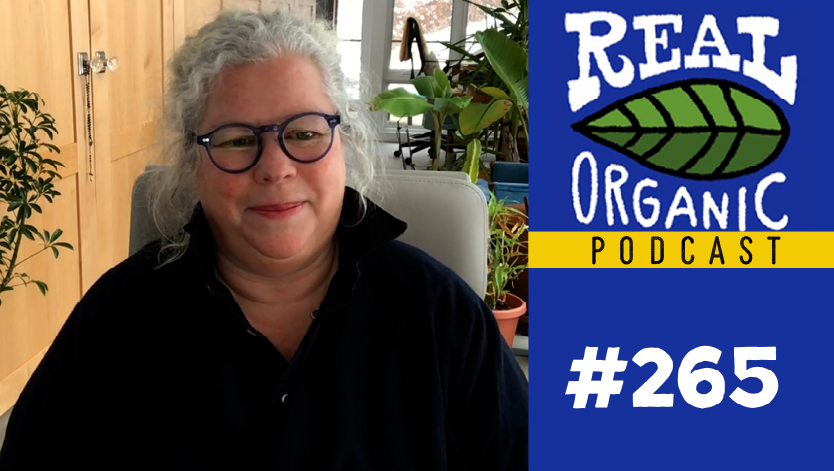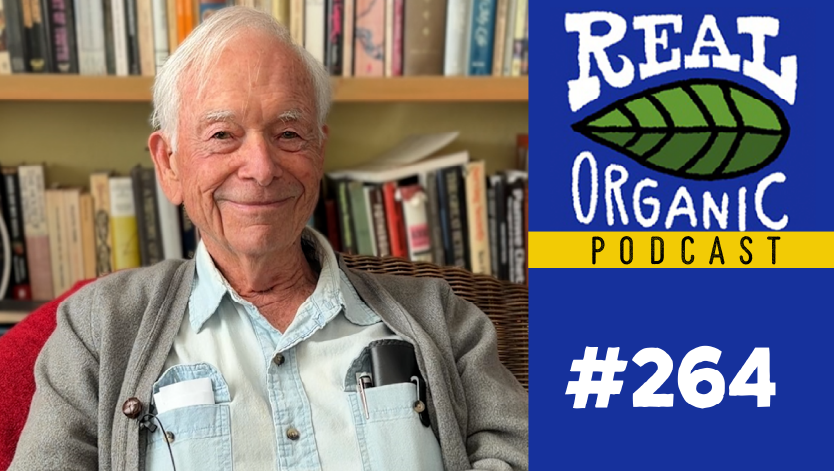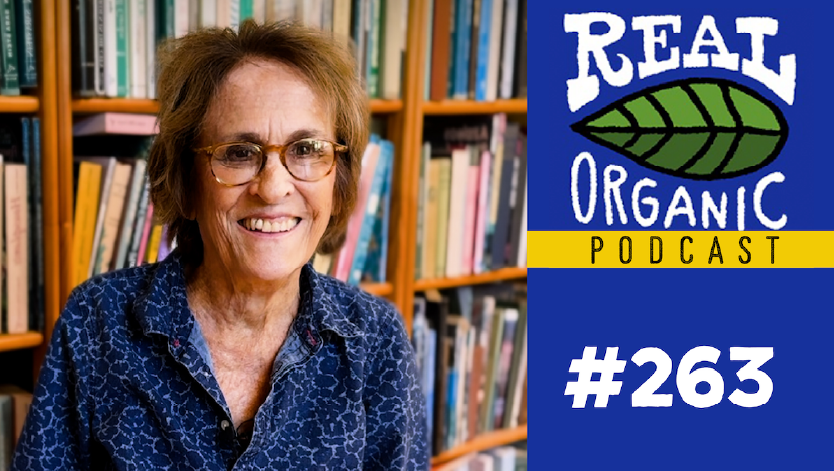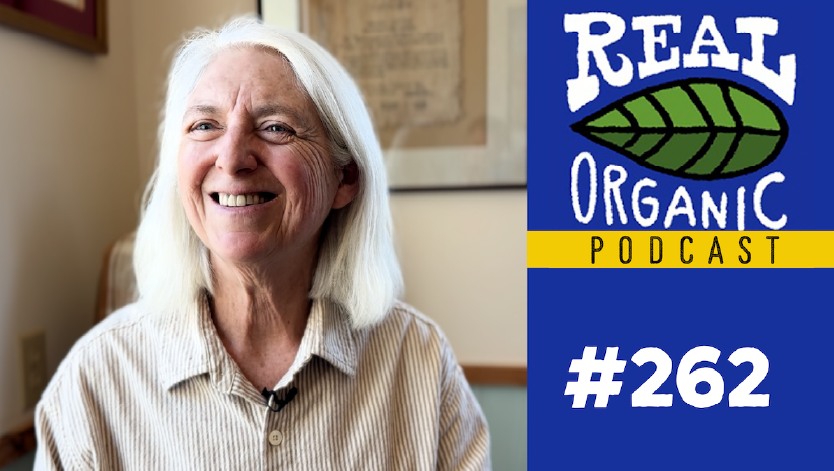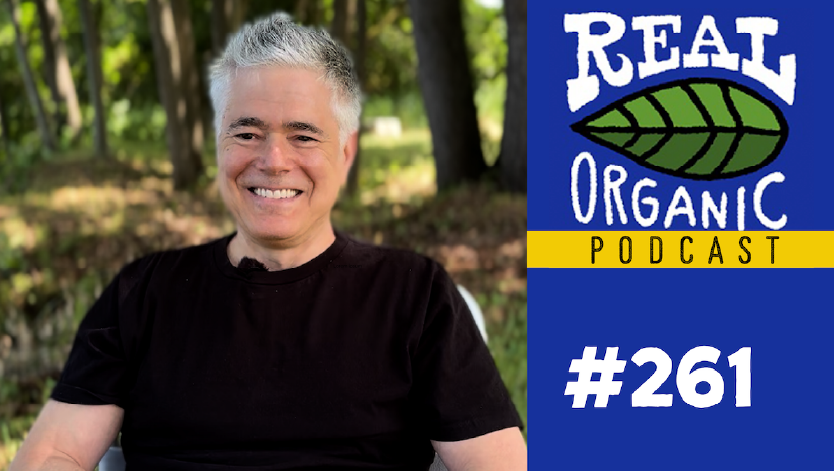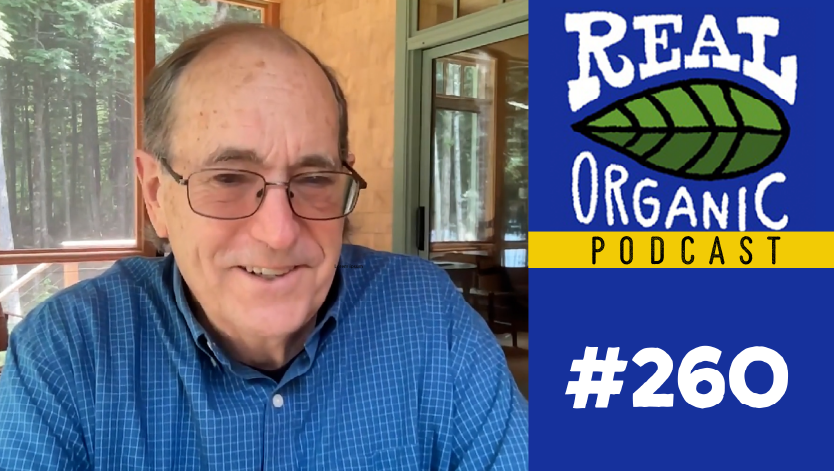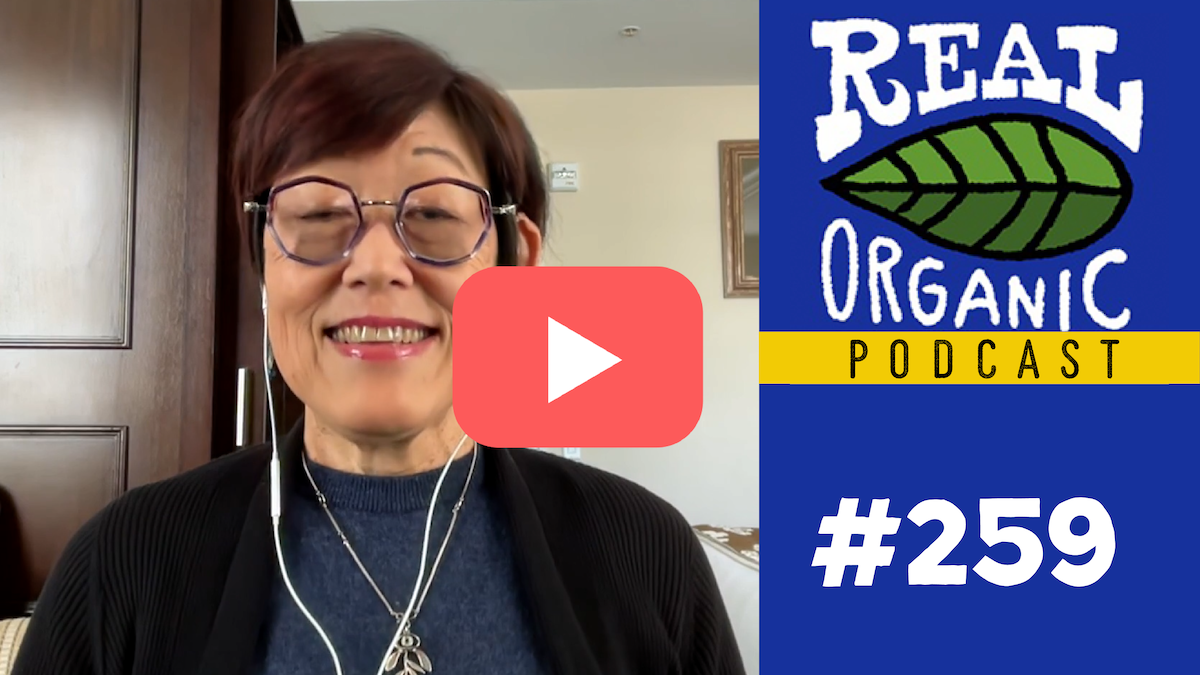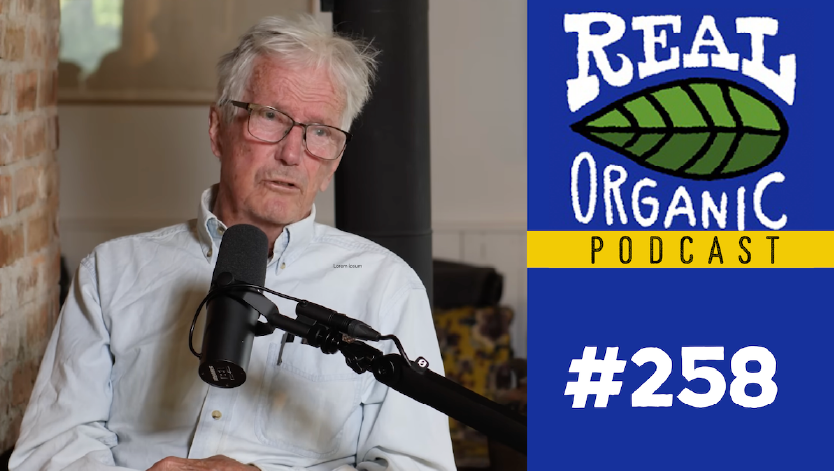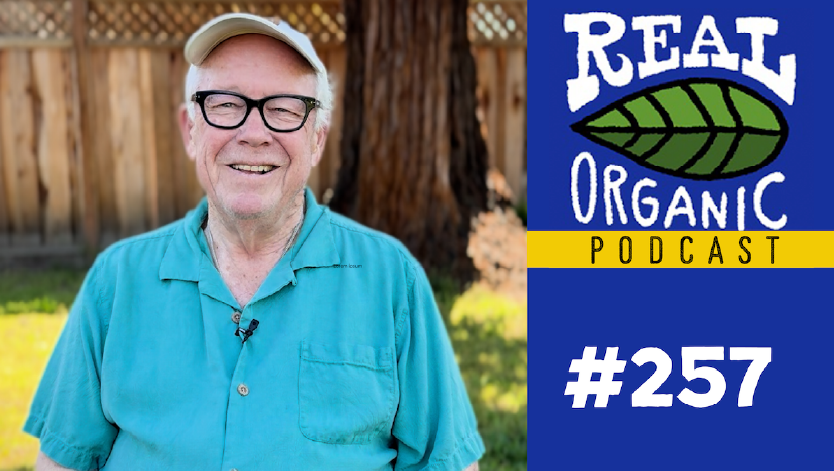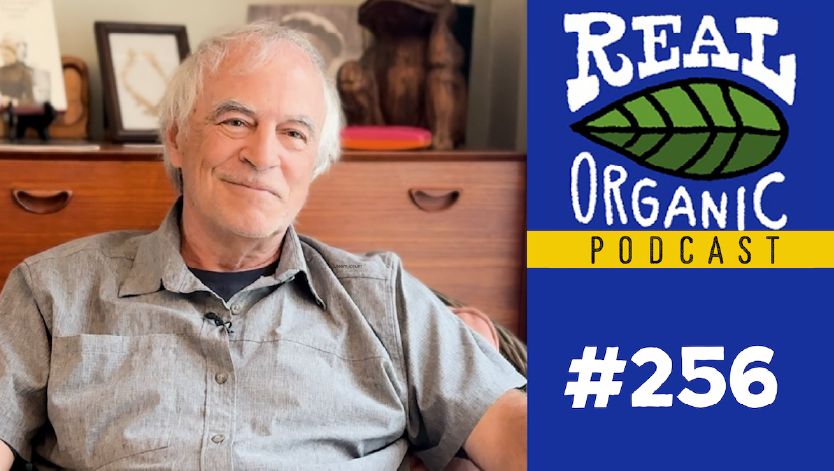Episode #203
Renee Lertzman: Successful Activism With Project Inside Out
Welcome! You can subscribe and download episodes of our show through your favorite podcast app.
You can also subscribe to receive the video version of each episode on our YouTube channel.
Our Renee Lertzman interview has been edited and condensed for clarity:
Dave Chapman interviews Renee Lertzman in California in January 2024:
Dave Chapman 0:00
Welcome to The Real Organic Project Podcast. And I’m talking Renee Lertzman today, whom I just met yesterday. So we’re at a gathering at Flea Street, a wonderful restaurant in Menlo Park. And you were there. I was there. And you said that, coming back to something in Flea Street had a lot of meaning for you. Could you talk about that?
Renee Lertzman 0:26
Yeah, so I actually grew up in Los Altos Palo Alto area, and growing up went too late for the train. Jesse’s first restaurant, yeah, the cafe. very impactful, very significant place in my life. So I remember the menu exactly, I remember the ambiance, the vibe, the whole scene, the ethos of it, you know, was very much a part of my life and my kind of identity as a young person as a teenager. And, and then I moved away, and I’ve been away for over 30 years. And just came back a couple years ago, and just literally rediscovered Fleet Street, like, a month ago. And ever since I’ve, I mean, I’ve just been going whenever I can, because it feels like just a gem of of soulful intentionality around food and food systems, but also a beautiful place where people can come together, says very meaningful for me that I’ve been cultivating this connection there again, after all this time.
Dave Chapman 1:54
Yeah. So you care about food? I do. Yeah. So actually, the meeting last night, we were talking a lot about food systems, and kind of stepping back a little bit. Of course, a lot of what happens in Fleet Street is looking closer, not further back and looking at the farms and the amazing food they grow. And the way it’s it’s cooked and presented. But we were talking about systems and how these systems really sculpt what actually ends up happening on farms, and in restaurants, and all of that. So real organic is concerned with creating change, to what we think would be a saner food system. And you are working to help people create changes. So let’s talk about that. How would you define your work?
Renee Lertzman 2:56
Well, it changes, but how I currently would define it as I support and enable changemakers. So people who identify as a leader, someone who’s trying to make some sort of change in the world, how to be more effective by applying psychological principles, ways of being ways of working, that actually shift how we approach this work from often feeling like it’s on us to try to make other people change, to actually looking at how can we, if we are changemakers leaders show up in a way where we are really here to guide others and cultivate the conditions that make it more possible for people to enter into a way of really looking at our, our existential situation and crises right now. And, and figure out what to do about it, how to how to move forward. So my training is as a psychologist, I have a deep training as a social science researcher. I’ve worked in pretty much every sector, every kind of organization, leadership’s teams, and really the common denominators. I’m really all about helping people who are trying to make change be more effective.
Dave Chapman 4:49
So how do you do that?
Renee Lertzman 4:54
Well, it’s it’s a process so So what often happens is we begin with some self reflection. And this can be within an entire organization. It can be with a team, it can be with one single individual leader can be with a leadership team. But we look at well, what are, first, let’s reflect on how are you doing? How are things going? And one is really, you know, what are your theories of change. So I feel really strongly that it’s so important for us as practitioners to foster an environment where it’s normal, and it’s okay to interrogate our theories of change. And so we begin with that. So in other words, a lot of times, people who start getting into change work, we were exposed to, you know, maybe schooling, training, job experience culture, where we’re from, and it’s it, we sort of start to internalize, well, yeah, we have to do this, it’s about this, this is that. And so in order to go on any kind of a journey, we have to do some inventory around. Okay, how am I approaching change? And so I’ll invite people, again, in a very non judgmental context to say, Okay, what is change look like for you what is required. And so I might use a prompt light change happens when, and it’s really cool to do this sometimes in a team. And all of a sudden, what you find is you make explicit what’s been sort of implicit, okay, right, like, so all of a sudden, in one single team, you’ve got will change happens when people are inspired, will change happens when they have more information. Change happens when it’s top down, change happens when it’s bottom up, change happens when people are scared. Change happens when we’re forced to change because there’s a crisis. And you get all of this out there. And it’s like, Okay, those are all theories of change. These are all different theories of change, that often an organization is not always conscious of, but just doing it, right, and so
Dave Chapman 7:21
often with even differing theories of change within the same organism,
Renee Lertzman 7:25
absolutely. And then not understanding why there might be some resistance or challenges in getting things through. So. So we start with, let’s look at our theories of change and create a culture where it’s healthy. And it’s normal to say, okay, maybe it’s time to revise or evaluate what my theory of change what our theory of change might be. And then we move into looking again, always with an attitude of curiosity, how am I showing up in this work? You know, am I showing up as a cheerleader? Where I feel like I have to get everyone feeling really motivated and excited? Am I showing up? Like an educator where I’m trying to just give everyone the information and then be that teacher going around? Am I writer ri ght? Where am I writing at people and saying, this is the right thing to do? And point, that kind of energy of pointing the finger? Or am I showing up more as a partner, as an advisor, as a guide, as a catalyst? As a and we need all of those, right? It’s like a lot of those modes of being we any change maker needs to be able to kind of tap in and out. But the whole point here, where we’re going is how do we do our change work in a way that’s actually attuned? Like, genuinely tuned in? And using this concept of attunement, meaning relational? So how do we actually do change work in a way that’s truly relational. And so, so that’s the kind of process I may lead people on. And usually it’s, it’s in the form of a journey or learning journey or something like that, where by the time we come out, people have them have had some sort of shift, where they are ready to leave, the more the ways of being that have actually been getting in their way and alienating people into being more having more capability to listen to hold space to to let
Dave Chapman 9:51
me challenge you a little bit here. So one of the things that I look around the world and I see there A lot of people who are very effective at creating change. And many of them, I’m horrified by the change they’re creating, which is the creating changes ethically neutral. May there, they’re wonderful changes. And there are other changes that seem very destructive from my, from my belief system, from my point of view. So the youth, do you feel that? What you’re talking about, I get the feeling that you think this will create good change? Are there? Are there elements of this that impact how that what kind of change will happen? Or I could I don’t know who you think of this being terrible, but it could it? Could they do the same thing of being attuned, and being present and being connected? And listening really well? And all of that, and thus be very effective? Do you see what I mean?
Renee Lertzman 10:53
Yeah, I mean, I think what I’m talking about isn’t rocket science in some ways. You know, in 2016, you know, after the election, I was feeling pretty, just so dismayed by the fact that the Republican Party had actually been so effective at speaking to people’s anxieties and their fears, and that the Democratic Party had just completely missed on that. So what I’m talking about here is, it’s like, emotional intelligence, one on one. That unless we actually truly address people’s deepest anxieties, their fears, their concerns, their vulnerabilities, it’s very, very hard to, to create those conditions for things to change. And we’ve seen evidence of, of the Trump folks doing that really well. All kinds of efforts have been doing that really well, because they are actually tapping into what works psychologically for people. So that’s where I’m coming from is to say, for those who are working on systemic transformative work and service of life, let’s just put it that way. Okay, I avoiding all the terms that now are complicated, like regenerative. But let’s just say in service of life, of life on the planet, well being of all, we need to be far more adept, and capable of tuning in to the underlying anxieties, the underlying ambivalence that people get pulled into, and their aspirations about what kind of world do we want to have. And what I observe is a tendency to avoid the anxiety to skip over the ambivalence, and to go right to aspirational. This is why this is important. You know, let’s just take organics and the need to make organic, more clear and accessible, and really deal with all the problems going on around confusion of what that means. And, you know, if for me approaching that through this lens, I would immediately want to understand well, what might be coming up for people with this topic, like, what anxiety might be there, and what ambivalence and ambivalence specifically refers here to the ways in which people find themselves pulled in competing directions, even despite themselves. So it’s like, well, I want to support that I want to do that. But but the cost or but what will my my husband is not on board, or my family needs me or I have too much else to think about. But that’s that’s ambivalence is where people are often really pulled. And part of them wants to go forward with you. Yes, I’m a good person, I believe in that. And then another part is saying, Well, I’m not so sure about that. And if we don’t listen and acknowledge that part, it just will get louder. And it will pull us away from our aspiration to actually do what we feel inside ourselves is the right thing to do. And that’s why ambivalence in a way, is really like one of the most important concepts to understand as a change maker is that often you’re dealing with people’s mixed feelings and. Right. Yeah. Different
Dave Chapman 15:02
parts are polarized in some Yeah, absolutely. Yeah. The name of your of your organization is inside out project inside object inside out. Yeah. And inspired by the movie Inside Out to some degree. Yeah. Yeah. And which, which I saw and loved. And thought has a lot of truth to it. Yeah. Amazing. A picture animation that is so revealing. Right? Yeah. So in that there are these different parts inside? This little girl and the parts are always arguing with each other making alliances? And that’s what you’re talking about that that we are not simple. Exactly. Don’t just have a part we don’t. Inside, we’re not united in saying yes, we’re going to do this. There’s always there’s always a complainer in there doesn’t matter which way this is. Right. Wait a minute, that wouldn’t be very kind, or you’re awfully greedy, or don’t let them push you around. Yeah,
Renee Lertzman 16:06
so exactly that. So those working on behalf of climate change, sustainability conservation environment, for many, many decades, have been behaving. And designing campaigns, as if that is not happening.
Renee Lertzman 16:30
It’s, it’s, they’ve been designed with this assumption that we have to pitch, we have to persuade, why this is the right thing to do. We need to do this, as opposed to
Renee Lertzman 16:51
taking on the board, the science that has informed inside out, like everything I do project inside out the film inside out. It’s based on, you know, tons of evidence based research, whether it’s neuroscience, cognitive science, psychodynamic trauma informed therapy, it’s like it’s all out there. And what I’m seeing is that those within these movements have not yet sort of updated and up level, are understanding of the human psyche, in in alignment with what you’re describing as these multiple parts inside of us. And when we don’t do that, what’s happening is we’re just as we’re just kind of pushing. And we’re only speaking to one part. And what we know from motivational interviewing, which is the body of work that informs a lot of what I do, which is a methodology in the public health sector. Evidence, like the most evidence based approach to helping people shift behavior in the public health sector. They talk a lot about when we only speak to one part of us, the other part argues, yes, so think about that in relation to everyone working on sustainability, food system change, if we’re not able to show up as attuned, and in a way to say, hey, you know what, like, we see your parts, we see that on some level, you don’t even want to have to think about this. You’re like, want to tell us to go away, or you, you have too many other things to worry about. And then on the other hand, we see that you really care. We see you, you care about this place, you care about your land, you care about your kids, you care about your future generations, we see that too. We see these intention, how can we? What can we do together to navigate that? So that’s a very different kind of approach. It’s a very different kind of message than only saying, you know, hey, this is what’s happening. We need to all get on board quickly. Yeah.
Dave Chapman 19:12
Have you? Have you heard that amazing bit of information about where the term carbon footprint came from? Oh, no. It’s amazing. It was created by Ogilvy and Mather, the advertising agency working for their client was British Petroleum. Okay. And it was enormously successful at shifting people’s attitude towards towards climate change to being one of guilt. Because, yeah, I do a lot of things that are not okay. Everybody does, right. Yes. Yeah, we’re all guilty. Yeah. And and it’s said, Yeah, you should feel guilty. And you should do something about what you do. And it made it entirely personal. And in fact, it made it that most people felt so much shame. They did nothing. Exactly. Yeah. So it was a brilliant use of this different parts inside. Yeah, for, I think, a very bad purpose, right, which is how do we stop change from happening.
Renee Lertzman 20:24
So what’s really interesting is I was literally just writing about this yesterday. Rosemary Randall is a Cambridge based Cambridge, UK based psychotherapist, who started an organization years ago called Cambridge carbon footprint. And then it became carbon conversations, what she did, and she’s the one that introduced me to motivational interviewing. What she did is she went out and had people go through the footprint calculator, but she completely flipped the script. So she deliberately did it in a way that was no shame zone. But the way she did, it was applying EMI, motivational interviewing at EMI for short, she applied EMI tools. So those include, you’d be sitting with someone, and they would be start to look at their data about their impact or carbon. And she would pause and she would say, so what comes up for you, when you see that about your air travel or about your, how you’re heating your house or whatever, you know, and she would invite the person to reflect and then she would just, she would listen for the ambivalence. And then she would do a practice that’s called Rolling with ambivalence or navigating where she would invite the person to really give voice to different sides. She found that going through this process with people led them to a far different way of relating with their footprint than a shame based shutting down. So this was an intervention, she was basically trying to do an intervention. Then she went on to, to move beyond the footprint calculator, and started small groups called carbon conversations that brought people together, usually in homes, and they would meet for six weeks or eight weeks at a time. And they would talk through their relationship with climate carbon, both personal individual, but also broader than that. And she created a context where people could actually, you know, safely talk things through, like, oh, you know, it’s really hard for me to imagine not seeing my family who live in Australia. But what she found is that having these these contexts for people, people would absolutely shift, often pretty dramatically. So people might decide, okay, you know, what we’ve through the course of doing this, we realize that we need to move to be closer to our family, or we’re not going to be we’re going to do one air, travel flight a year, or we’re going to do this or we’re going to do that. But people started getting into more of that active problem solving, kind of addressing how we can be more in alignment, just by being in a context where it was okay to talk about it, and to have the anxiety and the ambivalence be named and have that support to go through. So that’s great. Yeah.
Dave Chapman 23:40
That’s powerful. We, when I was interviewing Michael Pollan, I asked him, I’ve told this story, but it’s so powerful for me. I said, Michael, since you wrote Omnivore’s Dilemma 15 years earlier, have things gotten better, they gotten worse, in our food system. And he said, well, our awareness is growing by leaps and bounds. And we see all these young people who are really tuned into food and the impact of food and how it’s produced all these things, so the actual food system has gotten worse. And that that collision is pretty fascinating to me, where we have all this understanding. But I have not figured out how to move that into changing reality. Right? external reality. Yeah. So talking about your work to you, you know, that was beautiful, what you just said about by bringing in these parts that actually there was shame around embarrassment, and, and giving them a voice in a in a public conversation, that people actually were able to find a way to make change. That’s right.
Renee Lertzman 24:54
We need spaces to be able to reflect on what our relationship is with what we’re learning about. So it’s one thing to have more transparency, to have more awareness, more information about what’s happening, that in itself is maybe half the picture, you know, based on what we know, from, again, the incredible neuroscientific research about how humans process information and particularly charged information. You know, and by charged, it could be just a tinge of discomfort or shame, or conflict, or just this kind of this, like, oh, I don’t want to have to look at that that’s painful, it’s making me feel something. When that’s happening, humans cognitively shut down. So our capacity to actually process and integrate information can be impaired, if the information we’re learning about is, in fact, distressing, and charged. Now, what’s the solution to that it doesn’t end there. You know, the solution is what Rosemary was experimenting with. And now lots more groups are doing this, this is this, she was like a total pioneer. What it means is that humans need context to reflect, sense make, discuss, brainstorm, feel, just just, you know, be with the material. And when we create this context, things happen very, very fast. So you know, I might be doing an interview with someone. Again, I just wrote about this yesterday, because I’m working on a new book, and I’m writing about my fieldwork in Green Bay, Wisconsin, where I went to spend time with people in a region that’s very troubled ecologically with the Great Lakes and with water and air and, and so I went to talk to people who seemed like they were apathetic, based on a survey I designed, which was a very typical market research survey that a lot of environmental groups would use. And, you know, I came back with, you know, people who they don’t read much, they don’t watch much they, you know, and I’m like, Okay, I’m gonna go talk to them and find out what’s going on. And within a few hours, when there’s a context, where I was simply asking questions I was having, it was a very open ended kind of interaction about how were they feeling and sensing what was going on with the Great Lakes and with the water. Very quickly, they themselves began to solution without me having to say anything. So I’m sorry,
Dave Chapman 28:11
you use that as a verb. So they began to solution, what does that mean? They began to
Renee Lertzman 28:19
say, sort of solution ideated on what they could possibly do, that would be active for them. So for example, a woman who hadn’t been involved with any kind of environmental activities for 30 years, having this conversation without my having suggested anything, she would herself, say, you know, now that we’re talking about it, you know, I really do feel like I want to be part of this local group that’s working on the watershed. And, and I just watched it happen before my eyes. And what I realized is one a lot people know a lot already. They have a desire to want to do something. But we need more relational mechanisms that can enable us to get there. And so that’s my my vision for people working on change. My vision is that if you are a Foundation, an organization and nonprofit, a platform educational program, that a big part of what you’re doing is that you’re showing up as a guide and as a convener, where you’re saying, hey, let’s get together and talk about this stuff. And let’s doesn’t have to just be sit around and talk. It could be let’s go out and see this place or do this field trip or whatever, but but to really include process like some real facilitated, thoughtful process that allows people to be like, Wow, I’m seeing this field. And this is really making me Think about my own life right now. And it’s making me wonder, well, what can I possibly do about it? But magical things happen when we pull back. And we let other people come forward and think and talk and reflect on what’s happening.
Dave Chapman 30:26
So that sounds great. You’re talking about fairly intimate contact, one on one conversation. So you know, it’s like the story of the guy throwing the starfish back in the ocean, from the beach, and somebody comes running along and says, What are you doing? I’m trying to save the starfish. So they won’t die. Since you’re crazy. There’s millions of them won’t make any difference that runs on your gut picks up the starfish and throws it in the ocean says what made a difference to that one. So yes, we can do that. But I’m curious what your thoughts are about scaling this? Just, you know, is is that yeah, is that the next step? Or is that in fact, the wrong step? Should it always be one on one connection?
Renee Lertzman 31:18
No, I mean, so just to acknowledge will Rosenzweig would say propagate and not scale? Good? How do we change?
Dave Chapman 31:30
Yes, I’m going to talk to well, so how do we propagate this so that it grows? I know, we can’t call it an idea virus anymore, because viruses become unpopular. But But yeah, propagate is good. So that it grows well.
Renee Lertzman 31:43
So to me, it’s, it’s not that hard to imagine this light. To me, the ability to propagate this is so it’s so there, which is one we train, and, and develop the skills in people all over the place. And what I’m saying by that is, I mean, it can just be basic, facilitation one on one. Not everyone has to be, you know, the most incredible practitioner of motivational interviewing to be a very effective person facilitator and able to convene people. So. So I think that we can and should be bringing these skills, capabilities in wherever we can. Schools, organizations, all kinds of places, so. So there’s that there is, as I said, I feel that organizations need to see themselves and show up more as conveners and guides. And by that, I mean, if you have a space, if you have a platform, then use it to bring people together train a cohort of your people to be hosts facilitators. So they develop skills, and they have some co ownership and what’s happening, and they do it. And so it just can be incredibly self kind of perpetuating in that way.
Dave Chapman 33:27
That’s great. That’s kind of what we’re talking about. Right? Yeah, it’s a meeting yesterday. Yeah,
Renee Lertzman 33:32
that’s what I’m saying is, I think if you if anyone is interested in having a movement, you absolutely have to be doing that kind of work. Start with a small cohort, train them, have them go out and train others and and iterate and iterate and go from there. The other thing I just wanted to acknowledge is that everything I’m talking about can be translated as a major, major campaign, like marketing campaign, consumer facing campaign. brand strategy, leadership messaging, you know, could be President Biden getting up and saying, just using some emotional intelligence by saying, hey, I really get that. You all, are probably feeling this way. And you’re probably feeling this way. I’m feeling both of those things, too. And right now, we have an opportunity to address that. But without, you know, it’s like, it’s not that hard to acknowledge that many of us are feeling pulled in competing directions. So it takes a leadership messaging to be more attuned. And it also takes the willingness to translate this into our marketing our messaging to bring more of that humility, that human humaneness to say, Yeah, this is one more thing we’re asking you to think about, among so many things. One more thing. And we know that you have we know these are like super intense times. But guess what? We’re asking you to think about this for a reason. And this is why. So there’s just many, many ways of incorporating this in,
Dave Chapman 35:27
you know, clearly, people crave connection. And that’s why people join the proud boys, they crave connection, they crave community and 12 Step. Yeah, yeah. And well, and lots of things that people really care about and really join. And so you’re proposing, like, how do you turn it less into things where people are publishing letters and hoping people read them to a thing where people are convening? And it’s got to be enough joy or enough meaning in those meetings that they want to do it? Absolutely. You know, there’s an awful lot of things that we do go to meetings for that we wish we didn’t have to I
Renee Lertzman 36:12
know they should be really pleasurable. Yeah, like the meeting yesterday. Yeah, that was I’m serious. Like, what Jessie cool is doing. I mean, she’s modeling, she’s modeling. She has a restaurant, she doesn’t need to be having events at her restaurant, right? Imagine if more chef’s restaurant owners use their places, to convene people around issues that matter to the community. For a while, I used to have a fantasy of working with Starbucks and and what would it what would it look like if Starbucks basically had every Friday, we’re gonna have a host some climate conversations, they train Starbucks employees, or maybe they train some other people to be hosts, they get that pleasure of I’m hosting a Starbucks climate conversation, people come in, it might be challenging, my stuff might come up for people, but you ensure that folks have some training and some support for that. And the brand is now showing up, as you know, we are seeing a need or meeting a need we care were a convener. So that’s a lot of what I’m trying to say is how do we use our spaces? And how do we shift our theories of change, from less about, we’re here we’re doing our work, we’re producing all our material, and then we have to push it out there to oh, this is a farm. Like, we’re restaurant, a farm, a company, let’s and that’s also why I appreciate what the Google Food Lab has been doing. Because that’s they didn’t have to do that Michael didn’t have to create a Google Food Lab. But it was like, you know, my sense is he was like, I have an ecosystem, I want to use it in some creative ways. So I’m going to invite people in, we’re going to have some debate discussion, people get to connect and meet each other, see what happens, some nothing might happen. But all these things kind of fit together. Right? So the reason I created with project inside out, which is a grant supported initiative, meaning that we need funding and we need funder partners to keep going. But what we’ve done is create this incredible playbook and at the heart of it are these guiding principles. And each one of them touch on what we’ve been talking about, and they’re all related. So a tune is number one. So being attuned to the anxieties, the ambivalence and the aspirations of our constituencies, our people, our stakeholders. So there’s a being attuned reveal is how to communicate in a way that is actually attuned and emotionally intelligent. Three is is equipped so how do we provide training, development resources, so project inside out is free and you can go in there’s a ton of information I’ve just made available to anyone that’s equipping for is convening. And five is sustain and sustain means basically keeping keeping it all going and not and not being so fixated on the one law much, or the campaign election, or the target? The goal? It’s like, No, this is actually for the long, long,
Dave Chapman 40:11
long process along, everything’s an experiment. Exactly what works. And then let’s keep experimenting about how to make it work better.
Renee Lertzman 40:19
Yeah, exactly. That whole experimentation mindset. I’m glad that you brought that in. That’s, that should be in there. Because that’s, that’s also vital that we have this kind of spirit and almost like a lightness about like, hey, let’s try this out and see what we can learn here with the humility, that no one really knows what they’re doing right now.
Dave Chapman 40:41
You took the words out of my mouth, you know, I go to things like the gathering yesterday. And I don’t know what I’m doing. I have no training. I have very little experience, honestly. And it’s just like, Well, let’s find out. And after all, I’m not a professional. So I’ll try to have fun, at least, right? Because it’ll work out better that way. Anyway.
Renee Lertzman 41:05
So that quality is needed so much right now, what you just articulated If only more people in leadership roles could come out and just say, I don’t really know. Like, that’s so liberating. And empowering for other people to hear like, oh, wow, like, even she doesn’t really know. Or even he doesn’t really like, okay, that gives us permission. To be a bit more like, Alright, let’s see what we can do here. And how can we experiment?
Dave Chapman 41:45
This is good stuff. I’m curious. I promised you that we would end so we will. But do you have? Like, what’s your favorite example of this occurring in the real world? And you gave one from the woman in England? But just curious, do you have something where you go? Well, yeah, they did this and this and this. And look, it was amazing.
Renee Lertzman 42:11
Well, it’s starting to happen more. We just completed a learning journey, pilot last week for six weeks, and there were 25 changemakers from around the world, some from big NGOs, some from startups from all and already there, things are starting to happen. Like four people actually gave notice in their jobs, which was not an intended outcome, but but they’re starting to realize like, oh, wow, like, I want to be doing this kind of work, this kind of guiding different way of change making in the world. So I think we’re going to be seeing more happening as I as more and more people go through this work. The one example that comes to mind is actually with a company that I worked with, called VMware. And VMware came to me with a situation where they had these big, abstract goals, they call them the 2030 agenda, or something like that, you know, these big, like, SDG type goals. And they and I was working with this group that brought together you know, the philanthropic like the business kind of philanthropy, folks with the finance with the ESG. Office with the climate this and and they were all like, how do we figure out a way to enable every employee at VMware, to not only understand what our, our ESG goals are, but we want people to feel deeply connected with viscerally like, we want people to feel like I know what I’m doing as part of this. And I know how this relates to my job and my role, and all of that. So that was the challenge. And so we went on a, again, I designed this sort of a journey where we would meet and have these what I thought of as thought sessions, so they were, you know, talking about these frameworks, I’m sharing the different theories of change, and how are we showing up and these different guiding principles but in so doing, they were relating this to their context and their work. And so by the end of the journey, we went on, they themselves were able to create a, what they called an engagement activation framework that was grounded in the basis of guiding had to be guides, then they took it to the office of the CTO, and ran a sort of engagement. With that team, they all loved it. And then they were invited to kind of start to spread it out with across other business units and other teams. The whole premise of their approach was that they were not coming in with a big PowerPoint. They were actually coming in with questions and prompts and to say, what’s your experience with this already? What do you already know about this? What are you interested in learning more about this, so they really applied that listening, kind of holding a forum that enabled people, frankly, to be less kind of resistant, and more open to what it is. And in doing so, they were able to create these, you know, ways of working across the business units where people started to feel like they were part of it and had more of a sense of CO ownership. So that’s one example of taking that kind of a challenge, and approaching it as a series of conversations. And that’s where I think this is going is really how do we, how do we do this work in a way that’s conversation driven conversation based? What are the skills we need? What are the competencies, we need to be doing that? How can organizations get out of their own way? How do we look at the need to release some control? You know, if you are running something? Yeah. Which is very hard to do, because, you know, a lot of people doing this kind of work are doing it, because there’s a very high level of care and concern and commitment. Yeah. But sometimes that can make us blind. Right to other ways of being. Right.
Dave Chapman 47:12
Right. And even our, our skills can blind us, you know, the thing where they would audition, violin players, and the people who are running the audition were very skilled listeners, they just were blind to their own prejudices. So when I started putting them behind screens, they picked totally different people. They still could hear really well, they just weren’t prejudiced by what they saw. Right? So we can be blinded by the very thing that we’re competent at, because it’s blended in with everything else in us.
Renee Lertzman 47:53
Exactly. Yeah, I really feel strongly that what we need to be doing right now is really looking at what does it mean to be a change maker today. And really taking that seriously and bringing that into our meetings, our retreats, our convenings our summits and, and using those as opportunities for, you know, some soul searching and, and bringing in unexpected resources, like working with psychologists like me, or working with trauma informed people or working with an NVC person or like, like, let’s kind of think broadly here about how to develop and grow as changemakers. Yeah.
Dave Chapman 48:46
Renee, last words, anything you want to say?
Renee Lertzman 48:49
I’m just that I think this is a very dynamic time. And actually, in a lot of ways, it’s very exciting to see. What I sense is more openness, to look at ourselves and to kind of evaluate the ways that we’re doing things. So yeah. All right.
Dave Chapman 49:13
Thank you. Renee Lertzman, thank you very much for talking.


